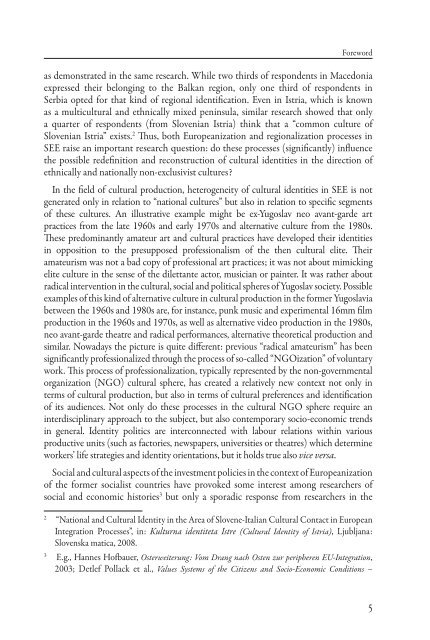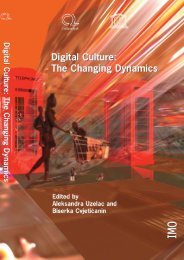free download in pdf format - Culturelink Network
free download in pdf format - Culturelink Network
free download in pdf format - Culturelink Network
Create successful ePaper yourself
Turn your PDF publications into a flip-book with our unique Google optimized e-Paper software.
Foreword<br />
as demonstrated <strong>in</strong> the same research. While two thirds of respondents <strong>in</strong> Macedonia<br />
expressed their belong<strong>in</strong>g to the Balkan region, only one third of respondents <strong>in</strong><br />
Serbia opted for that k<strong>in</strong>d of regional identifi cation. Even <strong>in</strong> Istria, which is known<br />
as a multicultural and ethnically mixed pen<strong>in</strong>sula, similar research showed that only<br />
a quarter of respondents (from Slovenian Istria) th<strong>in</strong>k that a “common culture of<br />
Slovenian Istria” exists. 2 Th us, both Europeanization and regionalization processes <strong>in</strong><br />
SEE raise an important research question: do these processes (signifi cantly) <strong>in</strong>fl uence<br />
the possible redefi nition and reconstruction of cultural identities <strong>in</strong> the direction of<br />
ethnically and nationally non-exclusivist cultures?<br />
In the fi eld of cultural production, heterogeneity of cultural identities <strong>in</strong> SEE is not<br />
generated only <strong>in</strong> relation to “national cultures” but also <strong>in</strong> relation to specifi c segments<br />
of these cultures. An illustrative example might be ex-Yugoslav neo avant-garde art<br />
practices from the late 1960s and early 1970s and alternative culture from the 1980s.<br />
Th ese predom<strong>in</strong>antly amateur art and cultural practices have developed their identities<br />
<strong>in</strong> opposition to the presupposed professionalism of the then cultural elite. Th eir<br />
amateurism was not a bad copy of professional art practices; it was not about mimick<strong>in</strong>g<br />
elite culture <strong>in</strong> the sense of the dilettante actor, musician or pa<strong>in</strong>ter. It was rather about<br />
radical <strong>in</strong>tervention <strong>in</strong> the cultural, social and political spheres of Yugoslav society. Possible<br />
examples of this k<strong>in</strong>d of alternative culture <strong>in</strong> cultural production <strong>in</strong> the former Yugoslavia<br />
between the 1960s and 1980s are, for <strong>in</strong>stance, punk music and experimental 16mm fi lm<br />
production <strong>in</strong> the 1960s and 1970s, as well as alternative video production <strong>in</strong> the 1980s,<br />
neo avant-garde theatre and radical performances, alternative theoretical production and<br />
similar. Nowadays the picture is quite diff erent: previous “radical amateurism” has been<br />
signifi cantly professionalized through the process of so-called “NGOization” of voluntary<br />
work. Th is process of professionalization, typically represented by the non-governmental<br />
organization (NGO) cultural sphere, has created a relatively new context not only <strong>in</strong><br />
terms of cultural production, but also <strong>in</strong> terms of cultural preferences and identifi cation<br />
of its audiences. Not only do these processes <strong>in</strong> the cultural NGO sphere require an<br />
<strong>in</strong>terdiscipl<strong>in</strong>ary approach to the subject, but also contemporary socio-economic trends<br />
<strong>in</strong> general. Identity politics are <strong>in</strong>terconnected with labour relations with<strong>in</strong> various<br />
productive units (such as factories, newspapers, universities or theatres) which determ<strong>in</strong>e<br />
workers’ life strategies and identity orientations, but it holds true also vice versa.<br />
Social and cultural aspects of the <strong>in</strong>vestment policies <strong>in</strong> the context of Europeanization<br />
of the former socialist countries have provoked some <strong>in</strong>terest among researchers of<br />
social and economic histories3 but only a sporadic response from researchers <strong>in</strong> the<br />
2 “National and Cultural Identity <strong>in</strong> the Area of Slovene-Italian Cultural Contact <strong>in</strong> European<br />
Integration Processes”, <strong>in</strong>: Kulturna identiteta Istre (Cultural Identity of Istria), Ljubljana:<br />
Slovenska matica, 2008.<br />
3 E.g., Hannes Hofb auer, Osterweiterung: Vom Drang nach Osten zur peripheren EU-Integration,<br />
2003; Detlef Pollack et al., Values Systems of the Citizens and Socio-Economic Conditions –<br />
5



